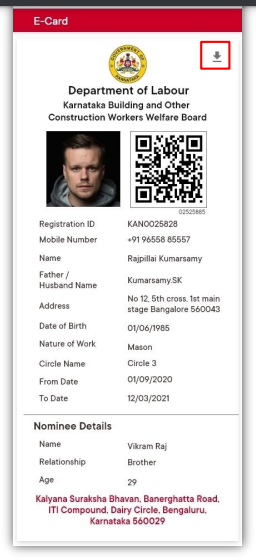Step 1: Getting the labour card | ಕಾರ್ಮಿಕ ಕಾರ್ಡ್ ಪಡೆಯುವುದು
What is a BoCW labour card?
A BoCW labor card is an official identification card issued to construction workers who are eligible under the BoCW Act. This is the first basic document required to avail entitlements under the BoCW Act.
Every construction worker must renew their registration with the Board every 3 years. If not renewed within this period, a 1-year grace period is granted. After that, the registration becomes invalid.
What are the requirements to get a labour card?
- Employment certificate ((Form V(A)/V(B)/V(C)/V(D)))- proof of having engaged in building and other construction (B&OC) work for a minimum of 90 days in the previous year.
Click here to download the 90-day work certificate template
The employment certificate is validated by a labor inspector and employer/ registered labor union/ gram panchayat.
- Age- between 18 and 55 years
- Age proof- Voter ID or Aadhaar card
- Aadhaar card- linked to a mobile number (Self-Attested)
- Bank passbook copy
- Ration card (non-mandatory)
With a recent change in guidelines ration card is not mandatory now; till 6 months back this was a required document for labour card renewal.
- Nominee's bank passbook copy
- Nominee and children's correct name and age details
If nominee and children's details are not provided at this time or are incorrect, it will lead to difficulty in availing benefits under various schemes.
Common reasons why construction workers fail to receive the benefits under BoCW schemes
Exclusion owing to policy design
- Gardeners, parking area employees etc. roles not considered construction work (CW).
Another example: a person drives a vehicle supplying water on construction sites. When the labour inspector calls for verification, he says I am a driver. So, the application gets rejected.
Trades such as mason, plumber, electrician are considered part of CW.
- Petty labourers don’t get the seal/ sign of contractors as they are often involved in irregular work at different worksites under different contractors.
- Physical verification of hands to figure out if the person is working with sand and cement.
- Aadhar-mobile link mandatory, but workers change their mobile numbers frequently requiring repeated linking.
Hard labor affects accurate bio-metric fingerprints.
At the time of verification, worker may switch to another worksite hence not available on previous construction site where he applied from.
Exclusion owing to lack of awareness
-
In extreme cases, workers who have been in this occupation for 20 years don't know about their entitlements.
Exclusion owing to lack of supporting documentation
- Many times workers leave their necessary documents at native place when they come for work, especially migrants from UP & Bihar
- Having a bank account with an Aadhar-linked mobile phone is a prerequisite, and many workers either do not have an account and/ or Aadhar card or the account is not linked with their Aadhar.
- Names, age and address don’t match in different documents
Petty laborers often face challenges in obtaining the seal or signature of contractors for work certificates since they work irregularly at various sites.
Exclusion owing to behavioural issues
- Migrants often require a local address to benefit from various schemes, but they are reluctant to change their address due to concerns about missing out on opportunities in their home states or to preserve important documents and proofs.
Applicants, especially recent migrants, are hesitant to disclose all documents and information to CSOs (Civil Society Organizations).
Once the application gets rejected there is no refund. So, workers are apprehensive of wasting money and go via agencies.
|
Annual Renewal
Trade unions can provide work certificate for 90 days but cannot provide muster rolls. As per the recent experience of some partners, the labour department has stopped accepting renewals without muster roll because, according to them, many non-construction workers have enrolled. Awaiting new format of muster rolls from the department. Workers with big builders do not face this problem.
The labor card requires renewal either annually or every three years. Workers often fail to keep track and experience delays in renewal leading to a loss of access to benefits. |
|
Examples of CSOs going the extra mile to get work done
|


2 Comments
test comment
why testing